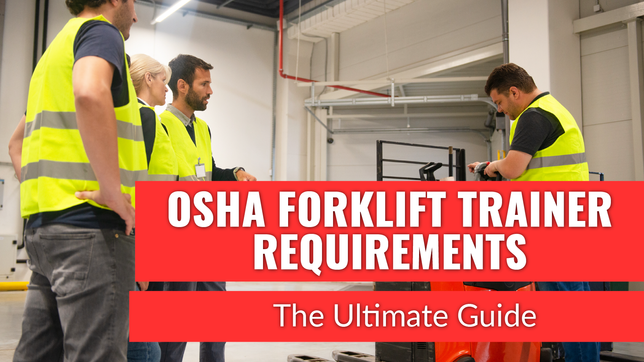Need to know what OSHA’s forklift trainer requirements are?
You’re in the right place because we’ve put together the complete guide.
Keep reading to get the scoop on:
- What OSHA’s forklift trainer requirements are
- How to assess prospective forklift trainers within your organization
- All your options for forklift instructor training
- How to set up your own in-house forklift operator training program
- And lots more!
Let’s dive in!
OSHA Forklift Trainer Requirements: A Simple List
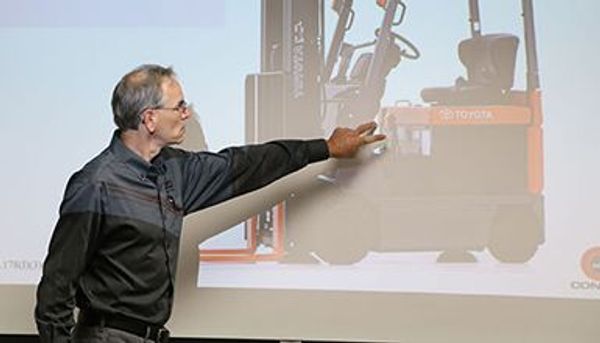
Here is a simple list of what OSHA’s forklift trainer requirements and qualifications are:
- Safely know how to operate a forklift machine.
- Be familiar with different models of forklifts.
- Be able to read and interpret forklift data plates.
- Understand the different parts of a forklift.
- Be capable of identifying workplace hazards and how to avoid them.
- Understand OSHA warehouse safety measures and regulations.
- Be able to instruct team members and new hires about forklifts, health risks, and safety measures.
How to Develop Your Own Forklift Train-the-Trainer Program
Here are the five key steps to take to develop your forklift train-the-trainer program that meets OSHA’s requirements:
- Know OSHA’s Rules: Before developing a trainer/operator training program, you should know the Federal and state OSHA standards for powered industrial trucks (PITs), including loading and unloading, refueling, reading data plates, and other relevant topics.
- Identify the Equipment and Operators: It’s necessary to be clear on the various types of forklifts and other powered industrial trucks in your workplace. You’ll also need to know which employees will be operating them.
- Develop Your Operator Trainer Course Materials: Per OSHA, the program must include practical (hands-on) training to know whether or not the operator has the required experience. Consequently, that will require that you develop comprehensive content for your trainer/operator training program.
- Provide for Employee Evaluation: This means observing the operator using the same type of forklift (and in the same working environment) as they would normally. Furthermore, only a certified trainer can provide an evaluation.
- Include Refresher Training for Operators: Each operator must undergo refresher training at least every three years. This training is also necessary under various conditions outlined by OSHA. Examples include situations where the operator has been part of an incident or near miss, observed driving unsafely, or when workplace conditions have changed.
How to Assess Prospective Forklift Trainers
OSHA mandates that all forklift operators must undergo proper training and certification before they are permitted to operate heavy forklift truck equipment. This requirement also extends to forklift trainers.
Employers are responsible for choosing competent forklift trainers. To accomplish this, they must carefully assess each candidate in three critical areas:
- Teaching abilities.
- Practical skills evaluations.
- Documentation of training experience.
Let’s cover each in more detail.
Evaluate Teaching Aptitude and Abilities

Evaluating the hopeful trainer’s teaching aptitude can include the following activities:
- Interviews.
- Observations.
- Trainee feedback.
- Sample lesson plans.
- Assessment of presentation and communication skills.
These methods can be used to evaluate the trainer’s teaching aptitude and how well they perform, given the opportunity to train forklift operators.
Test Practical Skills
Consider the hopeful forklift trainer’s comprehensive practical skills, which can include:
- Communication skills.
- Practical operating experience.
- Knowledge of OSHA regulations.
- Ability to operate forklifts safely and effectively in specific workplace conditions.
These skills are crucial in the practical operation of the forklift and the demonstration of the skills to the forklift operator trainees in the workplace.
Review Training Experience
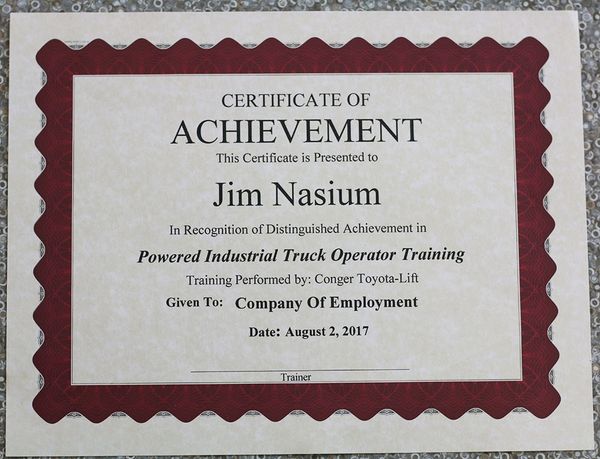
The forklift trainer should demonstrate the ability to document training experience, including the following:
- Any certifications or courses they have completed related to forklift operation and training.
- Documentations of prior forklift training undertakings in other places.
- Any required licenses.
Trainers with a solid training background may be more capable of effectively instructing forklift operators..
How to Become a Certified Forklift Trainer: 6 Fundamentals Every Trainer Must Master
To become a certified forklift trainer, you need to master the following six fundamental forklift instructor requirements:
1. General Safety Guidelines
The trainer must be able to provide comprehensive training on forklift safety protocols, including:
- Hazard identification.
- Accident prevention.
- Forklift inspection.
- Forklift safety tips.
- Forklift operations management and problems.
- Knowledge of protective dressing or personal protective equipment (PPE).
- Why one must follow all safety regulations
The trainer must also be able to demonstrate these safety guidelines, knowledge, and skills to the forklift operators.
2. Teaching Best Practices
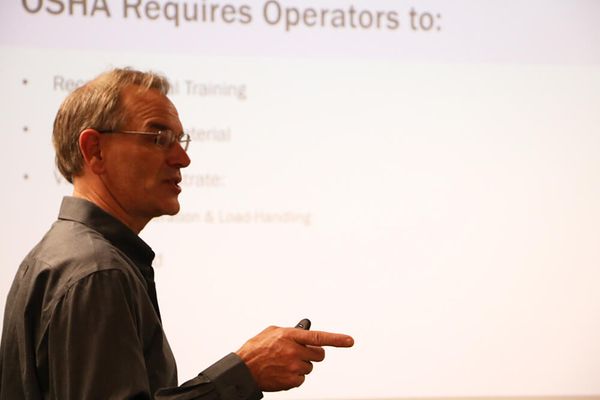
This section focuses on guiding effective training methodologies, instructional techniques, and strategies for creating a safe and engaging learning environment.
As an instructor, it is critical to create a welcoming learning environment that effectively encourages comprehension and practice for the learners.
The trainer should prepare both theory learning and practical skills development sessions, such as learning about forklift lockout/tagout procedures.
The learning should be engaging and encourage trainers’ participation.
It may also include supporting the development of forklift operator safety training.
3. Lift Truck Operation
A forklift trainer must understand how to operate a forklift truck to the standard required and be able to demonstrate it to the hopeful operators.
This understanding includes the fundamental principles and techniques of operating a forklift truck, including driving, safe maneuvering, load handling, and forklift controls. The training should involve classroom theory and a hands-on training evaluation tailored to particular lift trucks.
4. Federal and State OSHA Standards
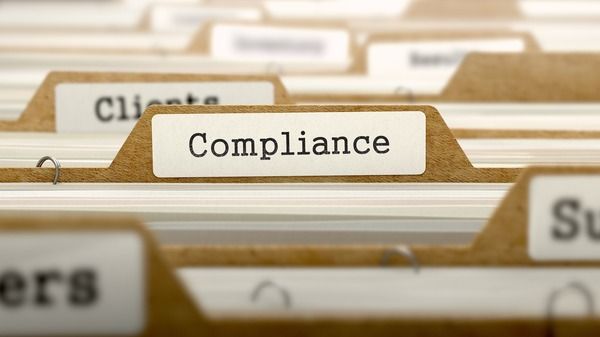
OSHA offers federal guidelines for forklift operations. Additionally, there might be state-specific OSHA regulations that outline their own set of guidelines for forklift operation, which you need to be mindful of.
Forklift trainers should know the current regulations and customize training classes to ensure complete compliance with changing federal and state OSHA requirements.
The trainer must ensure trainees understand the OSHA regulations concerning forklift operations, particularly with OSHA standards 29 CFR 1910.178 (Powered industrial trucks) and 29 CFR 1926.602 (Material handling equipment).
5. Documentation Requirements
The trainer must demonstrate the ability to teach trainers about necessary documentation, records, and reporting procedures related to forklift operations.
These can include, but may not be limited to the following:
- Operator certifications.
- Pre- and post-operation inspections.
- Incident reporting procedures.
- Forklift safety instructions.
The trainer must also understand that the employer is responsible for documenting operator training and evaluating the operator’s performance when using the forklift.
Documentation ensures that the workplace has a traceable reference for all occurrences and incidents to avoid future negative ones.
6. Operator Evaluation
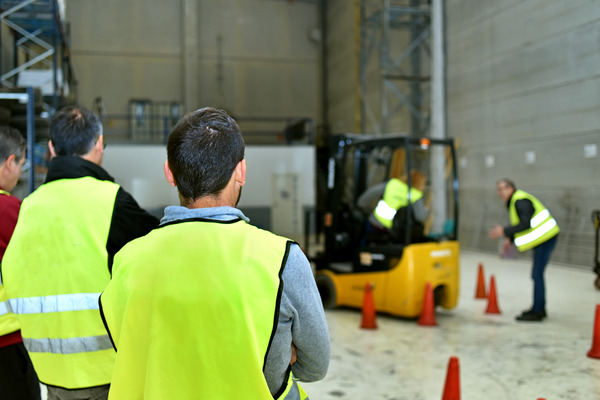
According to OSHA, a forklift operator’s performance must be assessed by a trainer at least once every three years. Consequently, the trainer must train and evaluate operators on equipment and procedures specific to the company’s operation and ensure OSHA compliance.
The forklift operator trainer must equip trainers with the skills to effectively:
- Evaluate forklift operators’ performance.
- Assess their competence.
- Provide constructive feedback for improvement.
Operator evaluation also involves assessing the operator performing engine inspection, load picking, unloading, driving/traveling, parking, fueling or battery recharging, and more.
The trainer should also be capable of demonstrating these skills in case an operator trainee needs assistance or clarification.
4 Key Benefits of In-House Forklift Operator Training
Forklift trainers are valuable to workplaces with various key benefits of in-house forklift operator training, including:
- Improve Safety: OSHA says around 70% of forklift accidents are preventable with better training. With an in-house forklift training program, you can go above and beyond to set your company’s high safety standards.
- Save Money:
- Using an in-house forklift operator training program means not having to pay a 3rd party each time a new hire needs training or an existing operator needs a refresher. Consequently, it helps save on training costs in the long run.
- Save Time: The forklift operator can schedule training to accommodate the needs of the operator’s schedule, which can help minimize disruptions and downtime.
- Gain Flexibility: You can adapt your training policies in-house according to your specific needs as an employer. For instance, you can set a day for new hire training or departmental training shifts.
Where to Find Forklift Instructor Training Courses
There are two basic options for forklift instructor training programs:
- Work with a local vocational or technical college that offers a forklift train-the-trainer program.
- Work with a 3rd-party training company.
Let’s discuss your options below.
Vocational or Technical College Forklift Trainer Certification
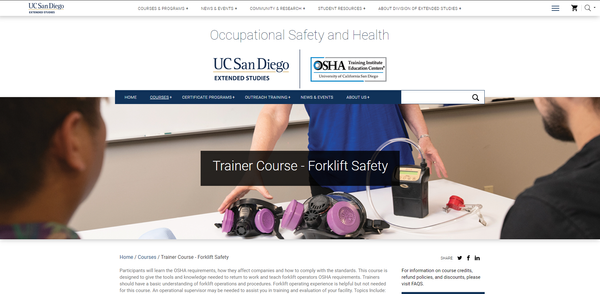
Some vocational or tech colleges offer forklift operator programs and forklift train-the-trainer courses or classes.
The advantage of going through these institutions is that you will be sure of a reputable certification.
The disadvantage is that they may be hard to find and inconvenient.
The easiest way to find out if a school in your area offers forklift trainer-the-trainer programs is:
- Find out through Google. First, google “tech schools + your city” or “tech schools near me.” This search will return every mention of the word “forklift” on the website. If nothing comes up, then they probably don’t have a training program.
- Call or visit the institutions to find out. Of course, you can always call them or walk into the institutions and ask if they offer forklift trainer courses.
3rd-Party Forklift Train-the-Trainer
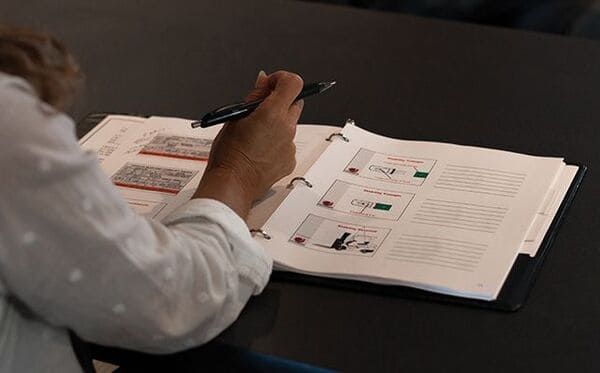
A 3rd-party forklift operator training company can be a dealership or a staffing company/agency.
For example, some dealerships like Conger have forklift train-the-trainer courses.
The advantage to going through a forklift dealership for training is that you know you’re getting quality instruction from folks who know and deal with forklifts.
To locate them in your area, search on Google for “forklift train the trainer,” followed by your city.
For example, if you live in Madison, Wisconsin, you’d search “forklift dealership Wisconsin” (without the quotes).
Then, browse the results and see if they offer a training program.
Common OSHA Forklift Trainer Requirements Questions
What Is In-House Forklift Operator Training?
In simple terms, in-house forklift operator training means the forklift training takes place at your business premise or workplace rather than an outside location.
The benefits of in-house forklift operator training include no travel or time away from work and training on the same equipment used in your workplace.
What Is Forklift Trainer Certification?
Forklift trainer certification is a training program where individuals learn how to safely operate a forklift and how to teach others to do the same.
Forklift trainer certification also involves receiving documentation confirming your gained knowledge and skills to operate a forklift machine and being able to train others on forklift operation.
What Does a Forklift Trainer Do?
A forklift trainer is responsible for training forklift operators and other staff members about forklifts and forklift operation, including:
- Instruct new hires on how to safely operate forklifts.
- Evaluate forklift operators for certification.
- Recertify forklift operators when their forklift operator certifications require renewal.
- Support the maintenance of health and safety standards in the workplace, including teaching forklift operators how to avoid them.
- Learn new makes and models of forklifts and train operators about them in case industry standards change.
- Develop company operator training standards.
- Guide effective training methodologies, instructional techniques, and strategies in the company.
Does a Forklift Trainer Have to Be Certified?
OSHA says that “[a] qualified trainer would be a person who, by possession of a recognized degree, certificate, or professional standing, or who, by knowledge, training, and experience, has demonstrated the ability to train and evaluate powered industrial truck operators.”
Does OSHA Require That Employers Offer Operator Training?
OSHA does mandate that employers must offer forklift operator training to their employees if they are required to operate a forklift as part of their job responsibilities.
OSHA holds employers responsible for ensuring that their employees are competent, certified, and able to safely operate a forklift in the workplace under normal working conditions.
Is Forklift Operator Training Required for Each Forklift Type?
If a workplace’s forklifts are different, OSHA requires that operators are trained and certified in operating the different forklift types.
For example, going from a 3-wheel sit-down to a reach truck would require new training as they are sufficiently different. This process ensures that operators can safely operate each forklift in the workplace under normal working conditions.
Who Can Train, Evaluate, and Certify Forklift Operators?
Anyone the employer certifies as competent and who meets the criteria in OSHA standard 1910.178(l)(2)(iii) can train, evaluate, and certify forklift operators.
Does OSHA Require Forklift Trainers to Be Certified?
Here’s what OSHA says:
“All operator training and evaluation shall be conducted by persons with the knowledge, training, and experience to train powered industrial truck operators and evaluate their competence.”
Ultimately, the employer must have confidence in the trainer’s competence to fulfill their duties.
How Could an Employer Determine the Qualifications of Trainers?
OSHA states, “An example of a qualified trainer would be a person who, by possession of a recognized degree, certificate, or professional standing, or who by knowledge, training, and experience, has demonstrated the ability to train and evaluate powered industrial truck operators.”
Can an Employer Certify Their Forklift Operators?
As long as the forklift instructor and the training program meet OSHA’s requirements, they can certify their operators.
When Does Forklift Train-the-Trainer Certification Expire?
Forklift “train-the-trainer” certifications don’t have expiration dates like a forklift operator certification. Nonetheless, there is an expectation that forklift trainers stay updated on the current industry standards and regulations.
Conclusion
That’s it: Your complete guide to OSHA’s forklift trainer requirements.
